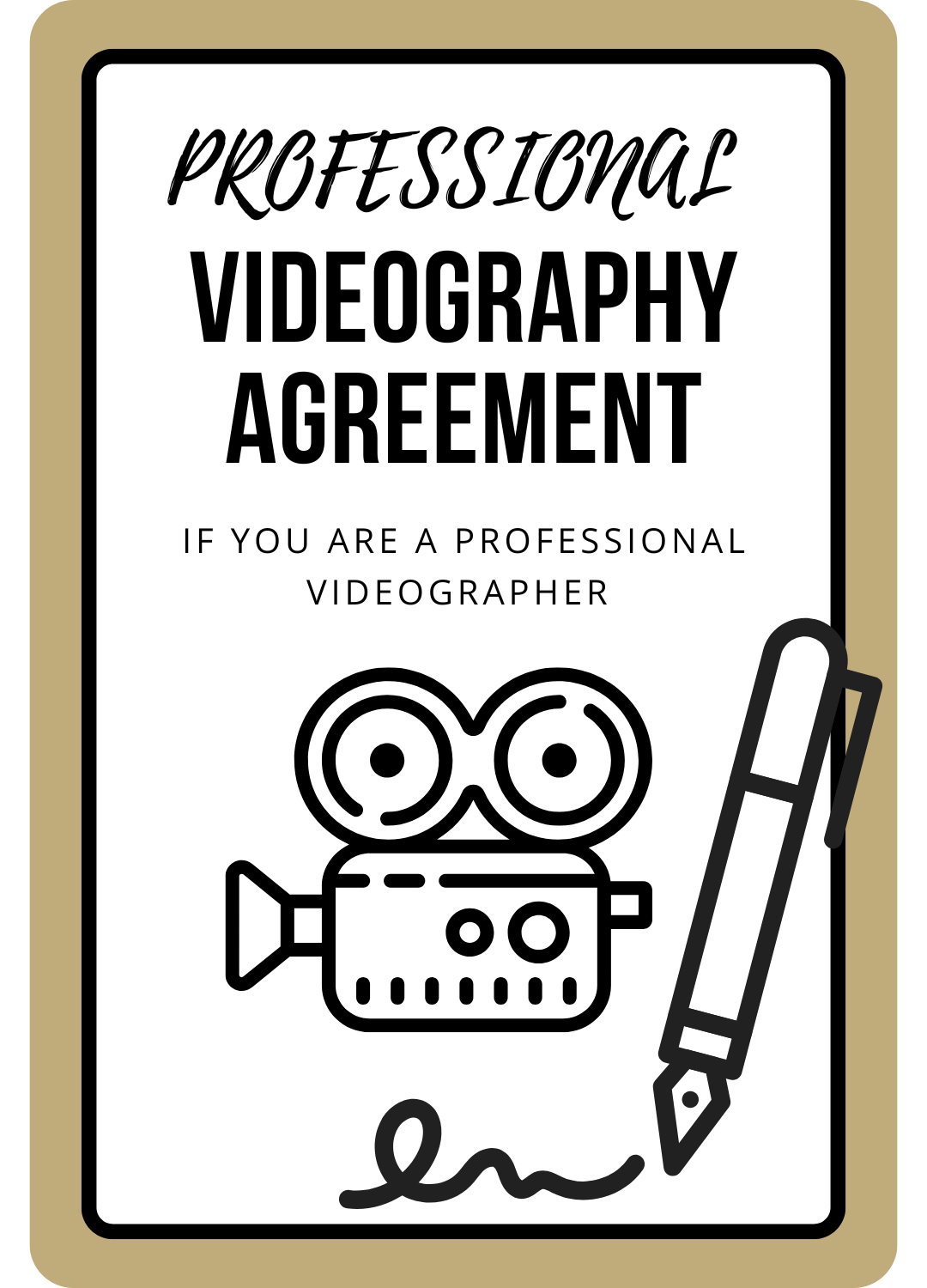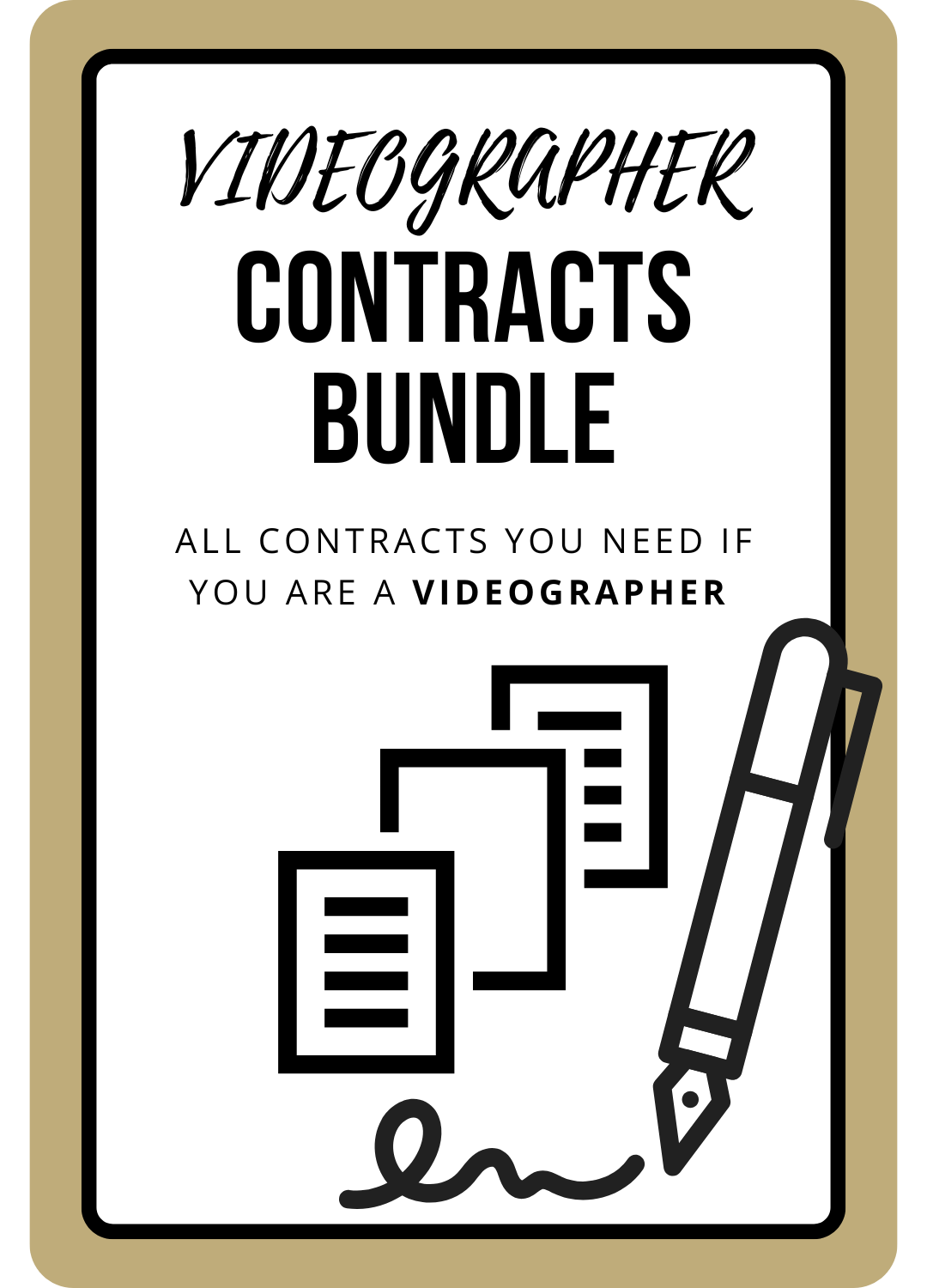7 Must-Haves for Every Videographer Contract Template (So You Get Paid & Stay Protected)
Want the best videographer contract template to protect your work and your paycheck? Without it, you risk client disputes, unpaid invoices, and losing control over your footage.
Turning your videography skills into a business is exciting — but it’s also a legal minefield if you don’t set clear boundaries from the start. I’ve seen talented videographers lose thousands (and their sanity) because their contracts were missing crucial clauses.
As a lawyer who’s worked with videographers across weddings, real estate, commercials, and events, I created a ready-to-use Videography Contract Template that includes all the protections you need — without the fluff or confusing legal jargon.
In this post, you’ll learn exactly what your videographer contract template must include, from payment terms to intellectual property rights — plus niche-specific disclaimers that keep you safe in every project (whether you’re using a any music, movie, event, commercial, real estate, or wedding videography contract template).
By the end, you’ll know how to:
Avoid payment delays and endless revision cycles
Protect your creative rights and self-promotion opportunities
Set boundaries that prevent client overreach
Confidently take on projects without worrying about legal risks
(thanks to your new fluff free videography contract template)
This post is all about the 7 must-haves every videographer contract template needs to protect your time, creativity, and income.
Best Videographer Contract Template
The 7 Must-Haves Any Videography Contract Should Include
1. Scope of Work
One of the most crucial parts of your videographer contract template is a clear, detailed scope of work. This section defines exactly what you’ll deliver — and protects you from clients who “suddenly” expect more without paying extra.
Think of it as your project’s blueprint. Without it, you leave the door wide open for misunderstandings, endless requests, and scope creep.
Example: You agree to film a corporate event and deliver one 3-minute highlight video. Without a specific scope, the client comes back expecting full-length interviews, a second promo video, and multiple social media cuts — all “included in the price.”
In my Videographer Contract Template, the scope of work section lets you specify:
The exact type of videography (event, commercial, wedding, documentary, etc.)
Specific deliverables (e.g., raw footage, edited videos, trailers)
Maximum video length & number of videos
File format (4K, HD, MP4, MOV)
Editing details (color grading, captions, effects)
Maximum revision rounds & drafts
💡 Pro Tip: Always set a maximum for deliverables, duration, and revisions in your videography contract template. It’s not about being inflexible — it’s about protecting your time and ensuring you’re never in breach if a video is a bit shorter or you hit the revision cap.
➡️ Want a plug-and-play scope of work section you can adapt for any client? Get my Videographer Contract Template — it includes all the must-have scope clauses, ready for you to customize.
2. What Is Out of Scope
If your scope of work is the “yes” list, your out-of-scope section is the “no” list — and it’s just as important. Without it, clients may assume certain services are included, and you’ll end up doing extra work for free.
Example: You film a wedding and deliver the agreed highlight video. The client then expects you to also create a separate “social media reel,” add licensed music you don’t own, and color-grade the footage in a completely different style — none of which was discussed or priced (and, none of which was explicitly excluded in your wedding videographer contract template).
By having a crystal-clear out-of-scope clause, you:
Manage expectations from day one
Avoid awkward “I thought this was included” conversations
Create an easy path to upsell additional services (instead of giving them away)
In my Fluff Free Videographer Contract Template, the out-of-scope section covers things like:
Using copyrighted/trademarked material without the proper license
Copying another videographer’s style or work
Providing written content (like captions or subtitles) unless specified
Any service or deliverable not explicitly in the scope or brief (the “catch-all clause” that saves you every time)
💡 Pro Tip: Treat this section like your insurance policy against scope creep. When it’s in writing, you can say “yes” to extras — but with a fair, additional fee.
➡️ My Videographer Contract Template already includes this bulletproof out-of-scope clause, so you can avoid misunderstandings and protect your time.
3. Process & Timeline
Even the best project can turn into a nightmare if the process and deadlines aren’t crystal clear. A strong videographer contract template doesn’t just say what you’ll do — it says when and how it will happen.
Example: You film a commercial in May, deliver the first draft in June… and then the client disappears for six weeks before sending feedback. Now your schedule is jammed, you can’t finalize the edit, and the final payment is on hold indefinitely.
A well-written process & timeline section ensures:
Filming dates, times, and locations are locked in
Responsibilities are assigned (who brings the equipment, who books the venue, who has access keys)
Maximum shoot duration is clear
Editing and delivery deadlines are set in writing
Client feedback deadlines are non-negotiable (with drafts considered “approved” if they miss them)
No compensation is owed if you miss a deadline due to factors outside your control
In my Videographer Contract Template, this section is structured to:
Keep projects moving with clear step-by-step timelines
Stop clients from ghosting you or stalling approvals
Protect you from being liable for delays you didn’t cause
💡 Pro Tip: Always include a “silence means approval” clause for feedback deadlines. It prevents endless revision cycles and keeps your payment schedule intact.
➡️ Want to stop chasing clients for feedback or final payment? My Videographer Contract Template includes the exact process & timeline clauses you need to keep every project on track.
4. Cancellation & Postponement
Without clear terms for cancellations and postponements in your videographer contract, you could end up losing days (or weeks) of income with nothing to show for it.
Example: You reserve a weekend for a wedding shoot, turning down other work. Two days before the big day, the couple cancels due to “budget changes” and expects a full refund. Without a cancellation clause, you could be left with empty pockets and wasted time.
Your videographer contract template should include:
Postponement terms — exactly how far in advance a client can reschedule without extra fees
Cancellation policy — how close to the shoot date they can cancel and still receive a (partial) refund
Force majeure clause — protects you from liability when events outside your control (like illness, bad weather, or accidents) prevent filming
Disclaimers for niche-specific issues — like equipment failure, no-shows, wardrobe malfunctions, or uncooperative pets/people
In my Videographer Contract Template, the cancellation & postponement section is designed to:
Compensate you fairly for lost booking dates
Give you flexibility for emergencies — without taking the financial hit
Make clients responsible for conditions that disrupt filming (and prevent them from blaming you)
💡 Pro Tip: Always require a non-refundable deposit to cover your lost opportunity cost if they cancel.
➡️ Don’t risk losing weeks of income over a last-minute cancellation. My Videographer Contract Template includes bulletproof cancellation & postponement terms you can customize for any project.
5. Copyright & Usage Rights
Your footage isn’t just content — it’s your creative property. Without clear copyright and usage terms, you could lose control of your work (and miss out on extra income).
Example: You shoot a product video for a small brand, thinking they’ll only use it on Instagram. Months later, you discover it’s running in a national TV ad campaign — without your permission or additional payment. But your commercial videography contract never specified what they could use the product video for…
Your videographer contract template should answer two key questions:
Who owns the final videos? (You, or the client?)
How can they be used? (Purpose, platforms, duration)
In my Videographer Contract Template, the IP rights section lets you choose and customize:
Ownership: Retain your copyright or assign it to the client for a set fee
Licensing terms: Define exactly how, where, and for how long the video can be used
Purpose restrictions: Advertising, promotional use, personal use only, etc.
Self-promotion rights: Keep the ability to showcase your work in your portfolio, on social media, and on your website — even if the client owns the video
💡 Pro Tip: Retaining ownership and licensing usage rights can be more profitable in the long run — especially if clients want to expand their use later.
➡️ My Videographer Contract Template makes it easy to set ownership and licensing terms so you can protect your work, prevent misuse, and get paid for extended usage.
6. Payment Terms
Getting the perfect shot means nothing if you don’t get paid on time — or at all. Without clear payment terms, you’re leaving the door wide open for late payments, disputes, and financial stress.
Example: You deliver a polished highlight reel, but the client keeps “forgetting” to send payment. Weeks turn into months, and chasing invoices eats up your time (and patience).
A strong videographer contract template should include:
Total project fee — clearly stated upfront
Payment schedule — deposits, milestones, and final payment deadlines
Late payment fees — interest or penalties for overdue invoices
Reimbursement terms — who covers travel, equipment rentals, or extra costs
Pricing structure tied to IP rights — full ownership vs. licensing/royalties
In my Videographer Contract Template, the payment terms are designed to:
Secure your cash flow with upfront deposits
Prevent clients from stalling payments until “after they see the final version”
Make sure additional costs are approved and paid without argument
💡 Pro Tip: Always require at least a 50% deposit before filming — it filters out flaky clients and protects you if they cancel.
➡️ Tired of chasing invoices? My Videographer Contract Template includes airtight payment terms that ensure you get paid on time, every time.
7. Liability & Indemnification
Getting paid is great — but keeping your hard-earned money is even better. Without clear liability and indemnification clauses, one dispute could wipe out your profits (and then some).
Example: A client insists you use a specific song in their video. Months later, the song’s copyright holder sends a legal notice — and without proper indemnification, you could be on the hook for damages.
Your videographer contract template should include:
Limitations of liability — cap the amount you could owe if something goes wrong
Indemnification clauses — require clients to protect you from claims caused by their requests, materials, or actions
Disclaimers — clarify what you’re not responsible for, such as results, third-party delays, or accidents during filming
In my Videographer Contract Template, the liability & indemnification section:
Reduces your financial risk to the maximum extent allowed by law
Protects you from third-party claims (like music licensing, property rights, or privacy issues)
Sets clear boundaries on what clients can and cannot hold you responsible for
💡 Pro Tip: If you work in high-risk niches (weddings, events, commercial shoots), tailor your disclaimers to the specific scenarios you face — it’s your legal safety net.
➡️ Don’t let one client dispute drain your business account. My Videographer Contract Template includes bulletproof liability, indemnification, and disclaimer clauses that keep you protected.
The Ultimate Fluff Free Videographer Contract Template — Ready to Use
You now know the 7 must-have clauses every videographer contract template needs to protect your work, time, and income.
But knowing what to include is one thing… drafting it from scratch is another.
Instead of spending hours (or days) trying to piece together legal language from random sources, you can get a fully lawyer-drafted Videography Contract Template that’s:
Customizable to your specific niche — music, movie, event, commercial, real estate, or wedding
Packed with protections — all 7 must-haves, plus 13+ niche-specific disclaimers
Easy to edit in Word or Google Docs — no legal jargon overload
Designed to get you paid on time and keep projects moving smoothly
Legally sound, so you can confidently take on any client
📸 Get your Videographer Contract Template today and start protecting your creativity, setting clear boundaries, and avoiding costly disputes.
➡ Grab Your Template Here
Want More Than Just the Videographer Contract Template?
The Videography Contracts Bundle includes this Videographer Contract Template — plus other key templates to cover your shoots, collaborations, and business assets:
Legal Website Bundle (Privacy Policy, Website Terms, Disclaimer)
Testimonial Release Form (to publish client reviews legally)
Media Release Form (for anyone appearing in your videos)
License Agreement (to grant or sell extra usage rights)
Why videographers love the bundle:
✅ Saves you hours of drafting and research
✅ Covers multiple scenarios so you’re never caught off guard
✅ Costs less than buying each template separately
🎥 Upgrade to the Videography Contracts Bundle today and safeguard every part of your business.
➡ Get the Full Bundle Here
This post was all about the essentials your videographer contract template must have for your videography business.
Learn more about how to protect your videography business in these blog posts:






